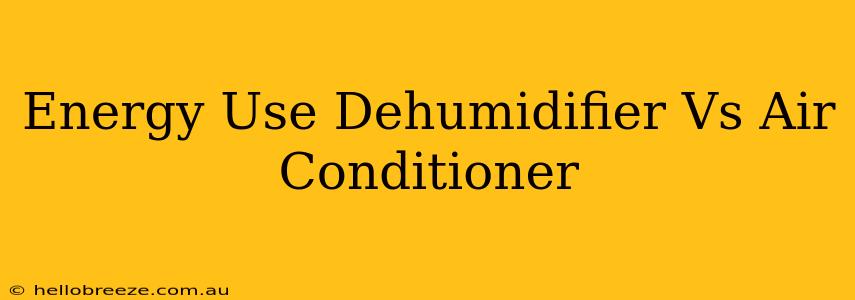Summer's heat and humidity can make your home feel uncomfortable. Two popular solutions are air conditioners and dehumidifiers. But which one uses less energy? The answer isn't straightforward, and it depends on several factors. Let's dive into a comparison to help you decide which is best for your energy needs and budget.
Understanding Energy Consumption
Both air conditioners and dehumidifiers consume electricity, but their methods and energy efficiency vary considerably. The key difference lies in their primary function:
- Air conditioners: Cool the air and reduce humidity as a byproduct. They use a refrigerant to absorb heat from the air, significantly lowering the temperature.
- Dehumidifiers: Primarily reduce humidity by condensing moisture from the air. They may slightly cool the air, but this is not their primary function.
Factors Influencing Energy Use
Several factors influence the energy consumption of both appliances:
- Unit Size & Efficiency: Larger units generally consume more energy, but a properly sized unit for your space will be more efficient than an undersized or oversized one. Look for Energy Star ratings to identify energy-efficient models. The higher the SEER (Seasonal Energy Efficiency Ratio) rating for air conditioners and the lower the energy consumption for dehumidifiers, the better.
- Humidity Levels: High humidity requires more energy from a dehumidifier to remove excess moisture. Similarly, high humidity can make an air conditioner work harder, increasing energy usage.
- Temperature Difference: The larger the temperature difference between the indoor and outdoor environments, the more energy an air conditioner will consume.
- Usage Patterns: Leaving either appliance running unnecessarily increases energy consumption.
Dehumidifier Energy Consumption
Dehumidifiers generally consume less energy than air conditioners, especially when the goal is primarily humidity reduction. They use less powerful motors and don't have to cool the air as much. However, running a dehumidifier constantly in extremely humid conditions can still lead to significant energy costs.
When to Choose a Dehumidifier:
- High Humidity, Moderate Temperatures: If your home is humid but not excessively hot, a dehumidifier is a more energy-efficient option. It tackles the humidity problem directly without the additional energy expenditure of cooling the air.
- Targeted Humidity Control: Dehumidifiers offer precise control over humidity levels, making them suitable for environments requiring specific humidity ranges, such as basements or closets.
- Smaller Spaces: For smaller rooms or areas, a dehumidifier is often a more cost-effective solution than an air conditioner.
Air Conditioner Energy Consumption
Air conditioners use significantly more energy than dehumidifiers, but they offer the added benefit of cooling. Their energy consumption can increase dramatically with high outside temperatures and large spaces.
When to Choose an Air Conditioner:
- High Temperatures and Humidity: In hot and humid climates, an air conditioner is necessary for comfortable living conditions. The cooling effect offsets the higher energy use.
- Large Spaces: Air conditioners are more effective at cooling larger areas compared to dehumidifiers.
- All-in-One Solution: For simultaneous cooling and dehumidification, an air conditioner is a convenient option.
Making the Right Choice
The choice between a dehumidifier and an air conditioner depends on your specific needs and climate. Consider:
- Your climate: How hot and humid is your area?
- The size of the space: Are you cooling/dehumidifying a small room or a whole house?
- Your budget: Air conditioners tend to have higher initial costs and energy consumption.
- Your priority: Is cooling or humidity reduction more important?
By carefully evaluating these factors, you can choose the most energy-efficient and cost-effective solution for your home comfort needs. Remember to always look for Energy Star certified appliances to maximize efficiency and minimize your environmental impact.

